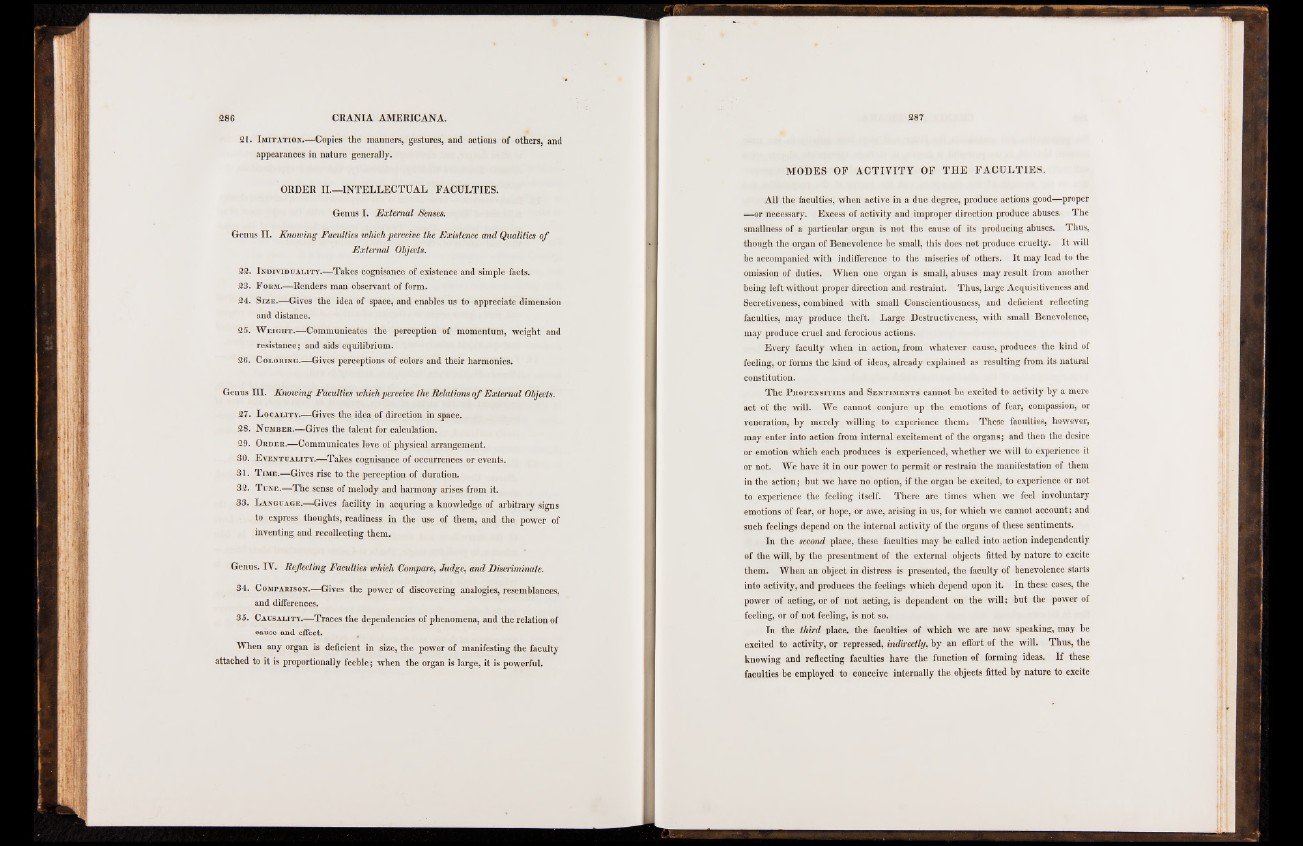
21. Imitation.—Copies the manners, gestures, and actions of others, and
appearances in nature generally.
ORDER II__INTELLECTUAL FACULTIES.
Genus I. E x te r n a l Senses.
Genus II. K n ow in g Faculties which perceive the E x istence a n d Q ualities o f
E x te r n a l Objects.
22. I ndividuality.—Takes cognisance of existence and simple facts.
23. F orm.—Renders man observant of form.
24. Siz e .—Gives the idea of space, and enables us to appreciate dimension
and distance.
25. Weight.—Communicates the perception of momentum, weight and
resistance; and aids equilibrium.
26. Coloring.—Gives perceptions of colors and their harmonies.
Genus III. K n ow in g Faculties which perceive the Relations o f E x te r n a l Objects.
27. L ocality.—Gives the idea of direction in space.
28. N umber.—Gives the talent for calculation.
29. Order.—Communicates love of physical arrangement.
30. E ventuality.—Takes cognisance of occurrences or events.
31. T ime.—Gives rise to the perception of duration.
32. T une.—The sense of melody and harmony arises from it.
33. L anguage.—Gives facility in acquring a knowledge of arbitrary signs
to express thoughts, readiness in the use of them, and the power of
inventing and recollecting them.
Genus. IV. Re fle cting Faculties which Compare, Judge, a n d D iscriminate.
34. Comparison.—Gives the power of discovering analogies, resemblances,
and differences.
35. Causality.—Traces the dependencies of phenomena, and the relation of
cause and effect.
When any organ is deficient in size, the power of manifesting the faculty
attached to it is proportionally feeble; when the organ is large, it is powerful.
MODES OF ACTIVITY OF TH E FACULTIES.
All the faculties, when active in a due degree, produce actions good—proper
—or necessary. Excess of activity and improper direction produce abuses. The
smallness of a particular organ is not the cause of its producing abuses. Thus,
though the organ of Benevolence be small, this does not produce cruelty. It will
be accompanied with indifference to the miseries of others. It may lead to the
omission of duties. When one organ is small, abuses may result from another
being left without proper direction and restraint. Thus, large Acquisitiveness and
Secretiveness, combined with small Conscientiousness, and deficient reflecting
faculties, may produce theft. Large Destructiveness, with small Benevolence,
may produce cruel and ferocious actions.
Every faculty when in action, from whatever cause, produces the kind of
feeling, or forms the kind of ideas, already explained as resulting from its natural
constitution.
The Propensities and Sentiments cannot be excited to activity by a mere
act of the will. We cannot,conjure up the emotions of fear, compassion, or
veneration, by merely willing to experience them. These faculties, however,
may enter into action from internal excitement of the organs; and then the desire
or emotion which each produces is experienced, whether we will to experience it
or not. We have it in our power to permit or restrain the manifestation of them
in the action; but we have no option, if the organ be excited, to experience or not
to experience the feeling itself. There are times when we feel involuntary
emotions of fear, or hope, or awe, arising in us, for which we cannot account; and
such feelings depend on the internal activity of the organs of these sentiments.
In the second place, these faculties may be called into action independently
of the will, by the presentment of the external objects fitted by nature to excite
them. When an object in distress is presented, the faculty of benevolence starts
into activity, and produces the feelings which depend upon it. In these cases, the
power of acting, or of not acting, is dependent on the will; but the power of
feeling, or of not feeling, is not so.
In the third place, the faculties of which we are now speaking, may be
excited to activity, or repressed, indirectly, by an effort of the will. Thus, the
knowing and reflecting faculties have the function of forming ideas. If these
faculties be employed to conceive internally the objects fitted by nature to excite